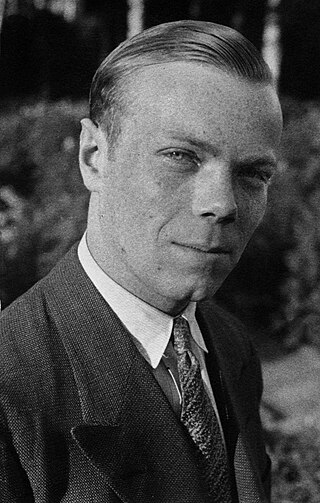
Laurent Lafforgue is a French mathematician. He has made outstanding contributions to Langlands' program in the fields of number theory and analysis, and in particular proved the Langlands conjectures for the automorphism group of a function field. The crucial contribution by Lafforgue to solve this question is the construction of compactifications of certain moduli stacks of shtukas. The proof was the result of more than six years of concentrated efforts.

Jacques Herbrand was a French mathematician. Although he died at age 23, he was already considered one of "the greatest mathematicians of the younger generation" by his professors Helmut Hasse and Richard Courant.

The French Academy of Sciences is a learned society, founded in 1666 by Louis XIV at the suggestion of Jean-Baptiste Colbert, to encourage and protect the spirit of French scientific research. It was at the forefront of scientific developments in Europe in the 17th and 18th centuries, and is one of the earliest Academies of Sciences.
The Herbrand Award for Distinguished Contributions to Automated Reasoning is an award given by the Conference on Automated Deduction (CADE), Inc., to honour persons or groups for important contributions to the field of automated deduction. The award is named after the French scientist Jacques Herbrand and given at most once per CADE or International Joint Conference on Automated Reasoning (IJCAR). It comes with a prize of US$1,000. Anyone can be nominated, the award is awarded after a vote among CADE trustees and former recipients, usually with input from the CADE/IJCAR programme committee.

Wendelin Werner is a German-born French mathematician working on random processes such as self-avoiding random walks, Brownian motion, Schramm–Loewner evolution, and related theories in probability theory and mathematical physics. In 2006, at the 25th International Congress of Mathematicians in Madrid, Spain he received the Fields Medal "for his contributions to the development of stochastic Loewner evolution, the geometry of two-dimensional Brownian motion, and conformal field theory". He is currently Rouse Ball professor of Mathematics at the University of Cambridge.

Artur Avila Cordeiro de Melo is a Brazilian and naturalized French mathematician working primarily in the fields of dynamical systems and spectral theory. He is one of the winners of the 2014 Fields Medal, being the first Latin American and lusophone to win such an award. He has been a researcher at both the IMPA and the CNRS. He has been a professor at the University of Zurich since September 2018.
The Leconte Prize is a prize created in 1886 by the French Academy of Sciences to recognize important discoveries in mathematics, physics, chemistry, natural history or medicine. In recent years the prize has been awarded in the specific categories of mathematics, physics, and biology. Scientists and mathematicians of all nationalities are eligible for the award. The value of the award in the late 19th and early 20th century was F50,000, about five times as much as the annual salary of the average professor in France. The award was F22,000 in 1984, F20,000 in 2001, €3,000 in 2008, €2,500 in 2010, €2,000 in 2014, and €1,500 in 2019.

Loïc Merel is a French mathematician. His research interests include modular forms and number theory.

Cédric Patrice Thierry Villani is a French politician and mathematician working primarily on partial differential equations, Riemannian geometry and mathematical physics. He was awarded the Fields Medal in 2010, and he was the director of Sorbonne University's Institut Henri Poincaré from 2009 to 2017. As of September 2022, he is a professor at Institut des Hautes Études Scientifiques.
Nikita Alexandrovich Nekrasov is a Russian mathematical and theoretical physicist at the Simons Center for Geometry and Physics and C.N.Yang Institute for Theoretical Physics at Stony Brook University in New York, and a Professor of the Russian Academy of Sciences.

Paris-Sud University, also known as the University of Paris — XI, was a French research university distributed among several campuses in the southern suburbs of Paris, including Orsay, Cachan, Châtenay-Malabry, Sceaux, and Kremlin-Bicêtre campuses. In 2020, the university was replaced by the Paris-Saclay University.
The Prix Ampère de l’Électricité de France is a scientific prize awarded annually by the French Academy of Sciences.

Nalini Anantharaman is a French mathematician who has won major prizes including the Henri Poincaré Prize in 2012.

Clément Mouhot is a French mathematician and academic. He is Professor of Mathematical Sciences at the University of Cambridge. His research is primarily in partial differential equations and mathematical physics.
The Sophie Germain Prize is an annual mathematics prize awarded by the French Academy of Sciences to researchers who have carried out fundamental research in mathematics. The award has been conferred every year since 2003 and comes with a €8000 cash prize. It is named after the French mathematician Sophie Germain.

Franck Barthe is a French mathematician. He was awarded the European Congress of Mathematics (ECM) prize in 2004. He is working as a professor of mathematics at Paul Sabatier University.
The Élie Cartan Prize is awarded every three years by the Institut de France, Academie des Sciences, Fondation Élie Cartan, to recognize a mathematician who has introduced new ideas or solved a difficult problem. The prize, named for mathematician Élie Cartan, was established in 1980 and carries a monetary award.

Hugo Duminil-Copin is a French mathematician specializing in probability theory. He was awarded the Fields Medal in 2022.
The prix Paul-Langevin is a prize created in 1956 and named in honor of Paul Langevin. It has been awarded each year since 1957 by the Société française de physique (SFP). The prize honors French physicists for work in theoretical physics.
The Prix de l'État of the French Academy of Sciences is a science award founded by the French National Convention in 1795 and financed by state funds. It is awarded in the fields of mathematics, physics, mechanics, computer science, earth sciences, biology and chemistry and is endowed with 7600 euros. It is awarded annually, with the exception of physics, which is awarded every four years.











